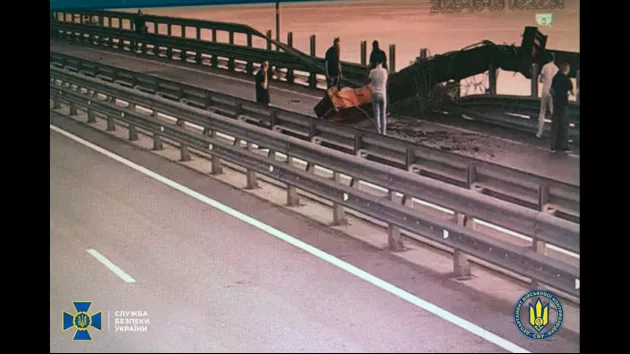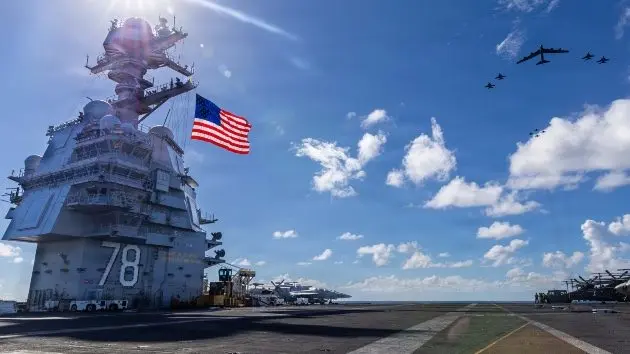
(LONDON) — Kremlin spokesperson Dmitry Peskov told journalists on Wednesday that Tuesday’s explosion at the Kerch Strait Bridge caused no damage, after the Security Service of Ukraine (SBU) claimed responsibility for the latest attack on the structure.
“Well, there was an explosion, nothing was damaged, the bridge is working, the Kyiv regime continues its attempts to attack the objects of peaceful infrastructure,” Peskov said at a briefing. “The Russian side takes appropriate precautions.”
The SBU said it attacked the bridge — which links occupied Crimea to Russia’s Krasnodar Krai region and is a prominent symbol of Moscow’s control over the occupied peninsula — with underwater explosives early on Tuesday, in an operation that “lasted several months.”
The SBU claimed that the explosion “severely damaged” the “underwater supports of the piers.” The official account for the bridge said the structure was “temporarily closed” after the explosion.
Meanwhile, with U.S.-brokered Ukraine-Russia peace talks still floundering despite another round of negotiations in Istanbul, Turkey, on Monday, Ukrainian President Volodymyr Zelenskyy and his top officials are applying more pressure on President Donald Trump to increase the cost of what they see as Russian obfuscation.
Trump returned to office in January having vowed to end the war in 24 hours. But months of failed talks — with Kyiv and Moscow clearly still far apart on their peace demands — has left the president and his administration publicly frustrated.
Trump has threatened both — Ukraine with the withdrawal of all aid and Russia with more sanctions — with punishment if his peace-making efforts fail. Both Ukraine and Russia have sought to frame the other as the main impediment to a peace deal.
Ukraine aligned itself with Trump’s May appeal for a full 30-day ceasefire, a proposal President Vladimir Putin has refused. In the weeks since, Zelenskyy has pushed Trump to meet Russia’s obstinance with sanctions.
Following Monday’s talks — which lasted just over an hour — Kyiv embarked on a renewed push.
“I want to thank all Americans, all Europeans who support this approach of pressuring Russia into peace — it is extremely important,” Zelenskyy wrote on Telegram on Tuesday night, following the latest round of deadly Russian drone and missile attacks on his country — and after two headline-grabbing attacks by the Security Service of Ukraine (SBU) on Russia’s strategic bomber fleet and the Kerch Strait Bridge.
“Putin does not change his behavior when he does not fear the consequences of his actions,” Zelenskyy added. “Russia must feel what war truly means. Russia must bear the losses from the war. They must really feel that continuing the war will have devastating consequences for them.”
The two sides did agree to further prisoner exchanges during the latest Istanbul talks. But both Ukrainian Foreign Minister Andrii Sybiha and Andriy Yermak — the influential head of Zelenskyy’s presidential office — pushed back on the notion that the negotiations moved the needle toward a lasting ceasefire agreement.
Yermak said in a post to social media that he spoke with Trump’s Special Envoy Steve Witkoff about the talks, telling him, “Russia’s position remains unconstructive.”
“I emphasized that Russia is stalling and manipulating the negotiation process in an attempt to avoid American sanctions and has no genuine intention of ceasing hostilities,” Yermak said. “Only strong sanctions can compel Russia to engage in serious negotiations.
Sybiha said Russia “has not responded to our document outlining Ukraine’s vision for ending the war,” in a post on X summarizing Ukraine’s official conclusions from the second round of talks.
“Instead of responding to our constructive proposals in Istanbul, the Russian side passed a set of old ultimatums that do not move the situation any closer to true peace,” he said.
“This contradicts Russia’s previous promises, including to the United States, that it would put forward something realistic and doable this week in Istanbul,” Sybiha added, also calling for new U.S. sanctions on Moscow.
Trump is also facing pressure at home. Republican Sen. Lindsey Graham — long influential in advising the president’s foreign policy — is among those pushing a sanctions bill through the Senate that would slap 500% tariffs on any country that buys Moscow’s energy products.
On Sunday, following a visit to Kyiv with Democratic Sen. Richard Blumenthal, Graham wrote on X, “Russia indiscriminately kills men, women and children. It’s time for the world to act decisively against Russia’s aggression by holding China and others accountable for buying cheap Russian oil that props up Putin’s war machine.”
The Kremlin urged patience. “It would be wrong to expect any immediate decisions or breakthroughs here,” spokesperson Dmitry Peskov told reporters on Tuesday of the latest talks. “But work is ongoing. Certain agreements were reached in Istanbul, and they are important. Indeed, first and foremost, it is about people. These agreements will be implemented.”
But Dmitry Medvedev — the former Russian president and prime minister now serving as the deputy chairman of the country’s Security Council — gave a darker read on the negotiations. The talks, he wrote on Telegram, “are not meant to achieve a compromise peace based on some imaginary and unrealistic conditions invented by others, but rather to secure our swift victory and the complete destruction” of Zelenskyy’s government.
Meanwhile, the long-range strikes that have unsettled Trump continued. Ukraine’s air force reported 95 Russian drones launched into the country overnight, of which 61 were shot down or neutralized. Impacts were recorded in seven locations, the air force said.
Russia’s Defense Ministry, meanwhile, said its forces downed seven Ukrainian drones overnight.
ABC News’ Ellie Kaufman, Oleksiy Pshemyskiy, Nataliia Popova and Will Gretsky contributed to this report.
Copyright © 2025, ABC Audio. All rights reserved.

